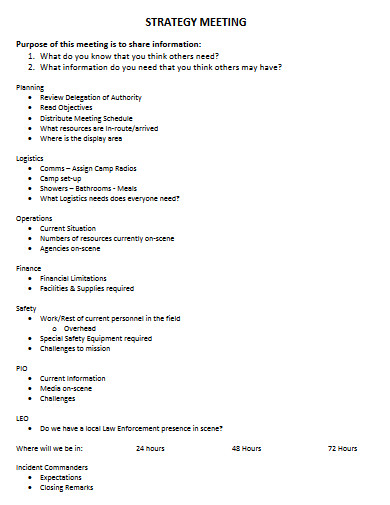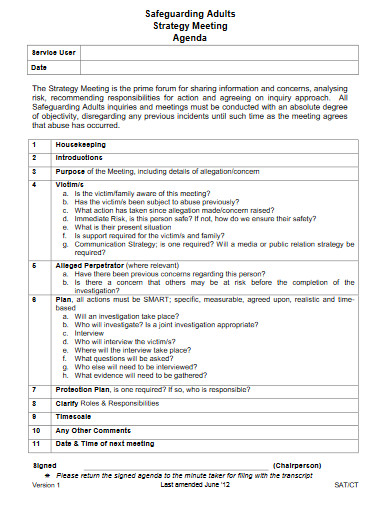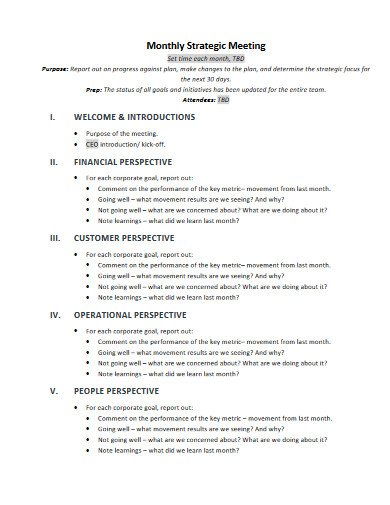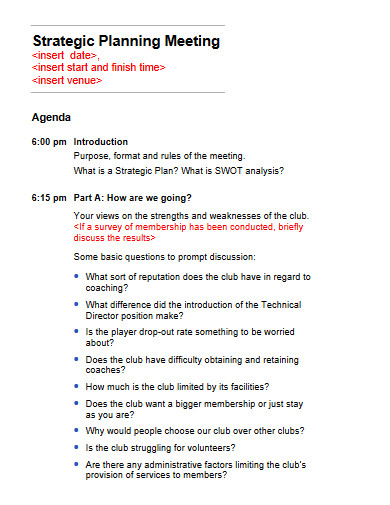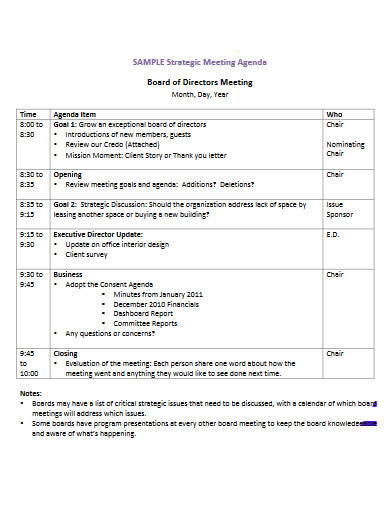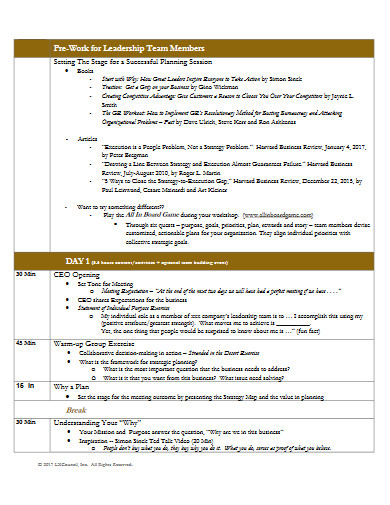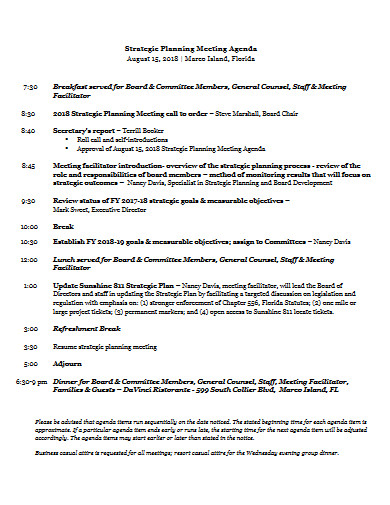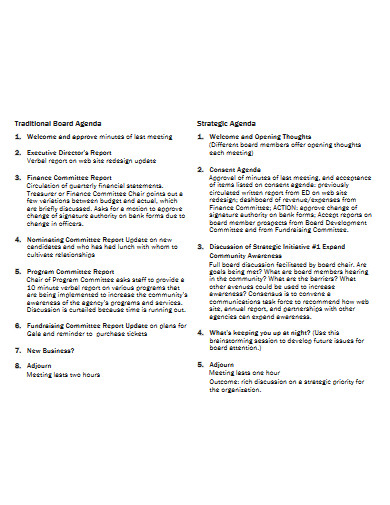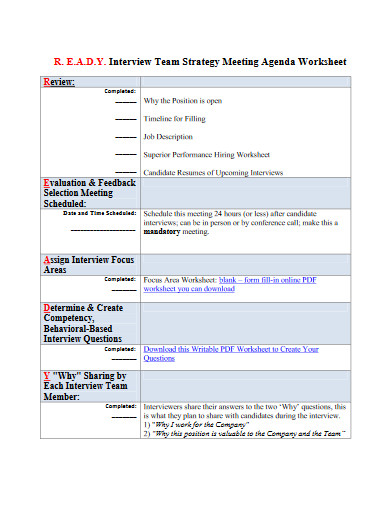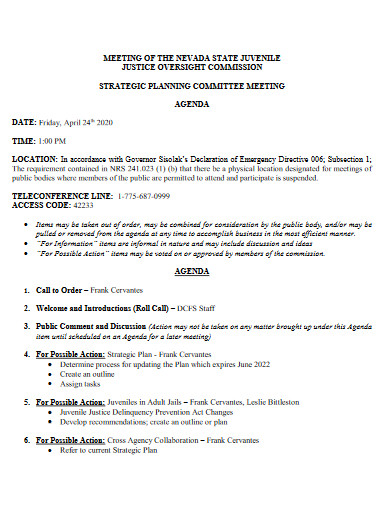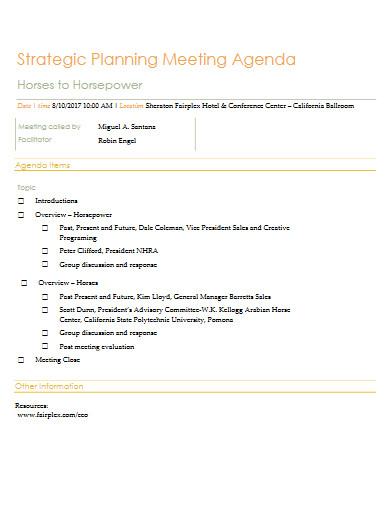10+ Strategy Meeting Agenda Examples to Download
A sports field requires knowledge of the game, teamwork, and above all, the right strategy. The team loses a potential win if they fail to come up with a strategic way on how to add a point on their scoreboard by relying too much on their individual abilities. This is no different in business. You can have the most talented team, but without strategic planning, it’s all for naught. Have a reliable strategy meeting agenda to guide your strategic sessions. This provides you with a complete outline of points that your team and management can discuss to come up with the best results to support your company’s plans. Check this out with the article below.
10+ Strategy Meeting Agenda Examples
1. Strategy Meeting Agenda
2. Adults Strategy Meeting Agenda
3. Monthly Strategy Review Agenda Template
4. Strategic Planning Meeting Agenda
5. Directors Strategic Meeting Agenda
6. Strategic Planning Meeting Session Agenda
7. Strategic Planning Meeting Agenda Example
8. Strategic Board Meeting Agenda
9. Team Strategy Meeting Agenda
10. Strategic Planning Committee Meeting Agenda
11. Strategic Planning Meeting Agenda in PDF
What Is a Strategy Meeting Agenda?
A strategy meeting agenda contains the main points of a strategic planning session. Unlike the usual business meetings, a strategic meeting requires more extended hours and involved managers and leading office positions to discuss long-term plans to address different topics. Strategy meetings can be intimidating and require much preparation. This demands all participants to have a thorough understanding of the goal to contribute their piece in completing the company’s goal setting.
How To Strategize Efficiently
According to Forbes, among the reasons why businesses fail in their strategic planning includes the lack of accountability, great reliance on the budget, lengthy business plans, and failure to see the bigger picture by being too meticulous with the details. More often than not, the positive forms of these reasons are seen as good. It’s true that there should be enough budget to cover the costs and that the plan should be as detailed as possible. However, without proper planning, all your good intentions might cause your strategy to sink.
To help you overcome these blunders, here are some ways on how you can strategize efficiently:
1. Think of the future. The daily operations and tasks can be draining, but there should be an action plan for the future.
2. Pay attention to consequences. More than focusing on the benefits, take the effort to assess the consequences as well.
3. Know your market. This could be the industry’s most repeated rule, but you must know what you’re doing and how to do it and who it will be for.
4. Get ready to adapt. You might have already established a plan for the next few seasons, but changes are everywhere. Don’t hesitate to act when there’s a need for customizations.
5. Look back on your past failed attempts. Your previous mistakes might be the last things you will ever want to review, but those might help you get a better perspective of your current situation.
How to Prepare a Strategy Meeting Agenda
Strategy meetings can be more challenging than the usual business meetings in the workplace. If you’re looking for ways on how to create your own, follow the guidelines below:
1. Establish Your Strategic Objectives
Start your agenda by determining what results from you want to accomplish through your meetings. This is why you need to have an objective first and foremost. This helps you decide which direction your meeting flow should follow. If your goal is to hold a strategic meeting to improve a project plan’s execution, you will be able to come up with points that point towards that goal. Your session will revolve around your plan’s implementation because you’ve established this on your agenda. This keeps you from straying from other topics that are beyond the meeting agenda’s objectives.
2. Determine the Main Points
Out of your objectives, make a list of your main points. This will be the different topics that you’ll be discussing during your strategic mission. Determining your meeting’s main points divides your goal into various narrow topics that you can address thoroughly. This also allows you to establish a program and plot a definite flow of your agenda. This is especially important if you only have a few minutes to hold the work meeting. For example, if you’re organizing a collaboration meeting between your sales and marketing team to improve your marketing plan with new promotional strategies, your topic should include different advertising methods and a target market analysis to make it appealing for your audience.
3. Ready the Logistics
Remember to answer your Wh’s and H questions. This is important in sending advance meeting invitations to attendees and coordinators. Finalize the date, time, and location of the session. Specify who will be joining the meetings and what roles they should play during the gathering. This allows them to prepare and pin the date on their schedule. Unlike standard meeting agendas, a strategy meeting requires preparation. It’s rare to have this meeting as an impromptu session unless it’s a follow-up. Remember to complete the logistics and inform every person involved an ample period before the said day.
4. Send Materials in Advance
If you’re going to feature materials or lengthy documents during the meeting, it’s best to send it in advance so the attendees can review it beforehand. It will take a significant amount of time if you’re going to show, explain, and interpret every part of the material because the participants have zero clues about its content. For example, if you’re having a budget meeting to implement a new operational strategy, you might want to send a copy of the financial report or the budget plan prior to the engagement, allowing them to familiarize the document’s relation to the agenda. During the meetings, they’ll know what to ask, and they will understand the presentation better.
FAQs
What is Henry Mintzberg’s five Ps of strategy?
Henry Mintzberg’s five Ps of strategy include plan, pattern, perspective, position, and ploy.
What are the three types of strategies?
The three types of strategies are corporate strategy, business-level strategy, and functional strategy.
What are the components of a formal meeting agenda?
The components of a formal meeting agenda include: Time, date, location, list of attendees Meeting objective Housekeeping (provides the welcome address of the meeting and a look back on the previous meeting) Agenda items
Strategic meetings are essential in ensuring that a business does not stay stationary about its plan but keeps moving forward by adapting to changes and creating new techniques. This keeps their operations alive and keeps them afloat in a competitive field. Equip your strategic sessions with a strategy meeting agenda from our display of various templates. This saves you the hassle of creating one so you can focus on organizing an efficient meeting. Download now!



